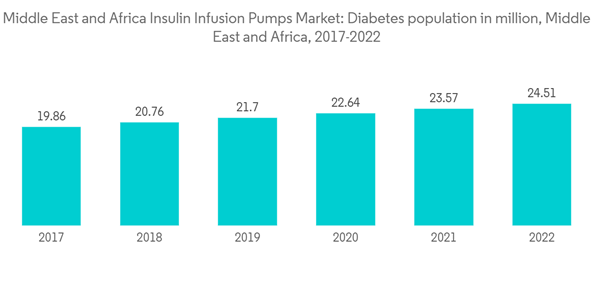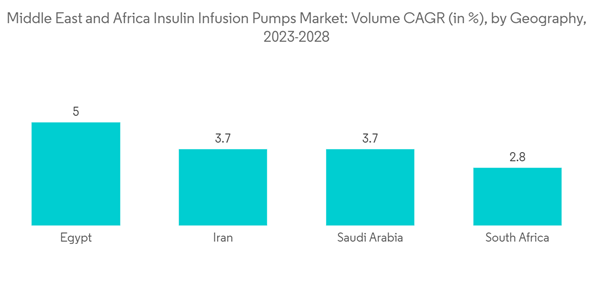The COVID-19 pandemic positively impacted the growth of the insulin infusion pump market in the Middle East and Africa. Patients with diabetes infected with SARS-CoV-2 experienced additional stress and increased secretion of hyperglycemic hormones, which resulted in elevated blood glucose, abnormal glucose variability, and diabetic complications. Diabetes and uncontrolled hyperglycemia were risk factors for poor outcomes in patients with COVID-19, including an increased risk of severe illness or death. To avoid complications, the patient's blood glucose level should be maintained at a normal level. The manufacturers of insulin infusion pumps had taken care during COVID-19 to deliver insulin delivery devices to diabetes patients with the help of local governments.
An insulin infusion pump works as an alternative to the traditional system of daily injections or an insulin pen. Insulin infusion pumps reduce the large swings in blood glucose levels, lessen pain, and deliver more accurately than injections. The scheduling of meal timings is not required when using pumps, which makes infusion pumps more user-friendly for patients. Insulin therapy is also known as continuous subcutaneous insulin infusion (CSII). It is an efficient and flexible method of insulin delivery.
In the African region, lack of testing facilities and equipment, inadequate number of trained health personnel, poor access to health facilities, and lack of awareness about diabetes are some of the barriers to diabetes testing. Currently, 24 million adults are living with diabetes in Africa. The International Diabetes Federation (IDF) states a 10.5% prevalence of diabetes worldwide. The actual prevalence varies by country and region, and the Middle East and North Africa (MENA) region has one of the world’s highest at 16.2%. Moreover, this is set to increase by 24% by 2045.
Technological advancements in insulin delivery devices have increased for safer and more accurate insulin administration. In 2021, Medtronic launched an Extended infusion set that leverages advanced materials that help reduce insulin preservative loss and maintain insulin flow and stability. The set is compatible with all MiniMed 600 and 700 series insulin pumps. The new tubing connector improves insulin's physical and chemical stability and reliability of infusion site performance and reduces the risk of infusion set occlusion.
Diabetes is associated with many health complications. Patients with diabetes require many corrections throughout the day to maintain nominal blood glucose levels, such as administering additional insulin or ingesting additional carbohydrates by monitoring their blood glucose levels. Diabetes poses an emerging healthcare burden across the region.
Owing to the abovementioned factors, the market studied is anticipated to witness growth over the analysis period.
Middle East and African Insulin Infusion Pumps Market Trends
Insulin Pump Device Hold Highest Market Share in current year
Insulin Pump Devices held more than 53% market share in the insulin infusion pumps market in the current year and are expected to grow with a CAGR of around 5% in the market during the forecast period due to the increasing technological advancement and its preference over other traditional methods due to continuous insulin administration.An insulin pump is a device that delivers insulin continuously or automatically whenever required. The pump mimics the human pancreas. The insulin infusion pump works as an alternative to the traditional system of daily injections or an insulin pen. Insulin pump therapy is a well-established insulin administration method for people with type 1 diabetes (T1DM). Pumps are a validated, time-tested therapeutic option in T1DM at all ages, enabling near-physiological insulin delivery in situations where the pancreas does not produce insulin.
There are even pump models with remote controls enabling parents of young children to either suspend or bolus insulin from a distance when the child is playing or eating. The insulin infusion pumps reduce the large swings in blood glucose levels, induce less pain, and deliver more accurately when compared to injections. Continuous subcutaneous insulin infusion (CSII or insulin pumps) and continuous glucose monitoring systems (CGMs) have improved patient care and quality of life and are widely used in the ambulatory setting. Increasingly, this technology is also being used in the hospital setting. These advantages of insulin pumps over the traditional delivery system are expected to boost the market.
The Middle East and African region have witnessed an alarming increase in the prevalence of diabetes; in recent years, the rate of diabetes is at an all-time high, mainly due to lifestyle changes. Governments in the ME have identified the threat of diabetes and started to respond with various policies, initiatives, and programs. Six out of 15 countries in this region still do not have a national operational action policy for diabetes. Many countries still do not have a national strategy to reduce overweight, obesity, and physical inactivity, which are important risk factors for diabetes. Most counties have fully implemented national diabetes treatment guidelines. However, constant measures are being taken to minimize diabetic complications; therefore, owing to the factors described above, the market's growth is anticipated in the Middle East and Africa.
Egypt is Expected to Dominate the Middle East and Africa Insulin Infusion Pumps Market
Egypt is expected to register a CAGR of over 4% during the forecast period.Egypt is the ninth country in terms of Diabetes prevalence worldwide. Currently, as per IDF, about 18.4% of the adult population in Egypt has diabetes. Due to the adaptability of new technology and the high prevalence of diabetes, Egypt dominates the market, among other countries. The CGM devices must be used alongside insulin pumps. As the trends show a higher number of diabetic patients moving to CGM for diabetes monitoring, it can be predicted that the number of units of insulin infusion pump devices sold will also follow. The insulin pump has evolved and is more reliable than it was previously. CSII technology has witnessed numerous technological advancements, like integrating continuous glucose monitoring with the pump. Now, insulin pumps can control the algorithm that automatically delivers the insulin after analyzing the blood glucose reading. Type-1 patients require monitored insulin dosages to maintain normal glucose levels, which may generate demand in the coming years.
In Egypt, the social level plays an important role in patients’ access to health care. The number of healthcare centers, hospitals, and pharmacies is very low in rural areas compared to big cities and urban areas. The financial level is a major determinant of people’s access to health care, as the salaries of most of the employees in Egypt are not enough to afford their monthly diabetes supplies. Insulin pumps are neither present nor covered by health insurance in Egypt. For students and school children with type 1 diabetes, the National Health Insurance System covers insulin, and the student pays nothing for NPH, mixed and short-acting insulins, and only 60% of the price of other types of insulin, which are usually not available in the pharmacies of the National Health Insurance System.
However, a growing demand for quality healthcare services in Egypt is spurred by changes, including an increasing aging population and a growing prevalence of lifestyle diseases. The government and private sector are involved in working on healthcare entities and ensuring affordability, access, and quality primary care.
Therefore, owing to the factors above, the growth of the market studied is anticipated in the country.
Middle East and African Insulin Infusion Pumps Industry Overview
The Middle East and African Insulin Infusion Pumps market is consolidated, with few major manufacturers. A few major players, like Becton Dickinson, Medtronics, Ypsomed, and Insulet, dominate the insulin infusion pump devices market.Additional Benefits:
- The market estimate (ME) sheet in Excel format
- 3 months of analyst support
This product will be delivered within 2 business days.
Table of Contents
Companies Mentioned (Partial List)
A selection of companies mentioned in this report includes, but is not limited to:
- Medtronic
- Roche
- Insulet
- Tandem
- Ypsomed










